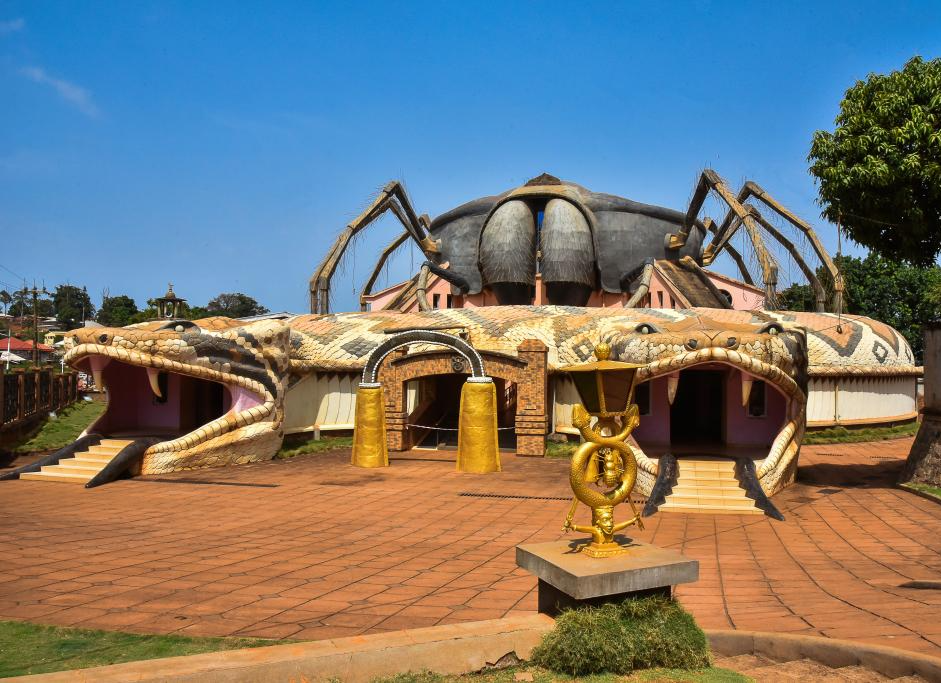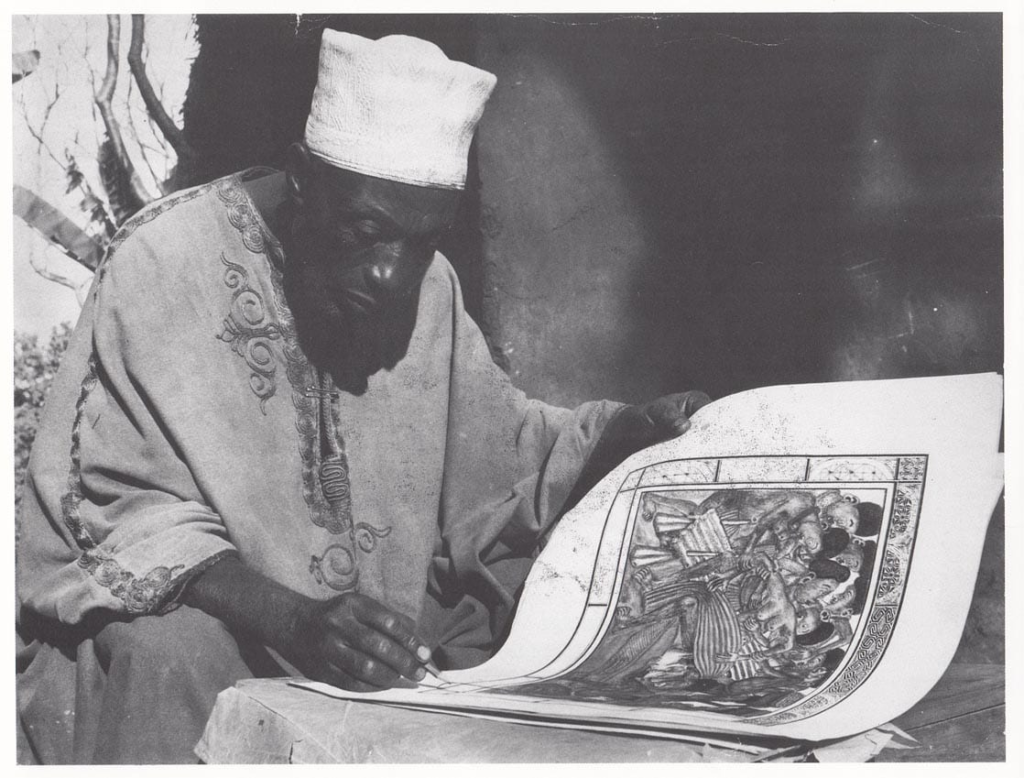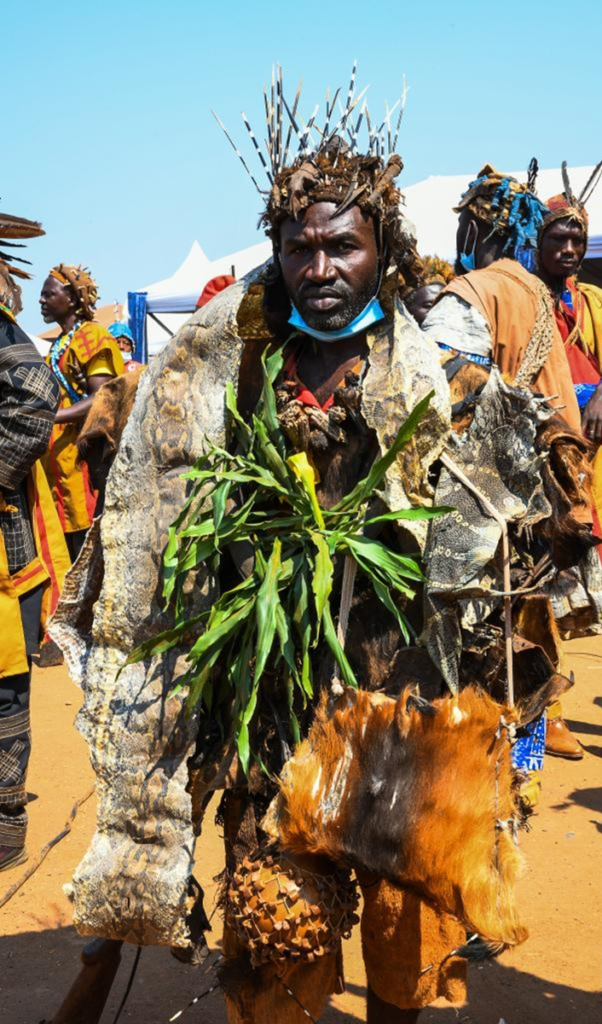In the contemporary landscape where globalisation and modernity seem to erode the cultural roots of peoples, the Kingdom Bamoun emerges as a beacon of resistance and cultural continuity. With over six centuries of uninterrupted history, this monarchy of western Cameroon represents not only a priceless historical heritage, but a living testimony to the ability of traditional African institutions to adapt and thrive through the centuries.

Entrance to the Royal Palace of Bamoun in Foumban, Cameroon, featuring symbolic snake sculptures and a giant spider structure
The Foundations of a Great Civilisation
The genesis of the Kingdom Bamoun has its roots in the 14th century, when founder Nchare Yen, from the Tikar kingdom, laid the foundations of what would become one of the longest-lived sultanates in sub-Saharan Africa. Establishing the capital at Foumban, Nchare did not merely conquer several local populations territorially, but created a system of governance that would weather the storms of history for over six hundred years.
The kingdom reached its territorial apogee under Mfon Mbuembue in the 19th century, ruler who embodied the Bamoun warrior spirit with the motto of marking borders 'with blood and black iron'. His strategic skill was manifested in the victorious resistance against the Fulani invasion in the 1820s, when he fortified Foumban with a defensive system that stopped the enemy cavalry. Mbuembue left to posterity the emblem of the two-headed snake 'Ngnwe peh tu', symbolising Bamoun's ability to fight on two fronts simultaneously and win both battles.

Sultan Ibrahim Njoya of Bamoun standing beside a historic throne carved from a single block of wood, exemplifying Bamoun's indigenous royal art
Ibrahim Njoya: The Visionary of the Cultural Revival
The most emblematic figure of the dynasty undoubtedly remains the Sultan Ibrahim Njoya (1860-1933), 17th Bamoun ruler, whose legacy transcends geographical and temporal boundaries. His reign, which lasted from 1886 to 1933, was characterised by an extraordinary synthesis of tradition and innovation, demonstrating how African monarchies could be engines of progress without betraying their cultural roots.
The invention of the Shumom script represents perhaps Njoya's most revolutionary contribution to world civilisation. Understanding the risks of oral transmission of traditions, the sultan developed an indigenous writing system that evolved from hundreds of pictographic and ideographic characters to seventy syllabic letters. This writing was used to codify laws, document the history of the kingdom and preserve the recipes of the traditional pharmacopoeia. The adoption of this system in schools and the royal administration demonstrated the foresight of a ruler who understood the importance of the written record for cultural survival.

Sultan Ibrahim Njoya of the Bamoun Kingdom examining traditional artwork, highlighting his cultural and intellectual legacy
Architecture of Power and Cultural Symbolism
The Royal Palace of Foumbancompleted in 1917 under Njoya's supervision, represents a unique architectural synthesis blending traditional Bamoun elements with European influences. This magnificent brick structure is not only the residence of the sovereign, but the beating heart of Bamoun culture, tangible symbol of the resilience of a monarchy that has managed to navigate through German colonisation, French mandate and Cameroonian independence while keeping its identity intact.

The Royal Palace of Foumban, the historic and cultural heart of the Bamoun monarchy in Cameroon
Inauguration in 2024 of the Museum of the Bamoun Kingscommissioned by the current Sultan Mouhammad-Nabil Mforifoum Mbombo Njoya, bears witness to the contemporary commitment to the preservation of cultural heritage. This 5,000 square metre museum space houses a vast collection illustrating the artistic, craft and technological wealth of the Bamoun people, from bronze casting to elaborate textile work.
Art as the Language of Tradition
Bamoun artistic production represents one of the finest expressions of traditional African art. The mastery of bronze casting, delicate woodworking and textile artistry reach levels of excellence that attest to a sophisticated material civilisation. The commemorative sculptures of ancestors, entirely decorated with multi-coloured glass beads, and the carved royal stools represent not only objects of art, but vehicles for the transmission of cultural values.

A participant in traditional Bamoun attire during the Nguon festival in Foumban, celebrating Bamoun royal heritage and culture
The Nguon: Traditional Democracy and UNESCO Heritage
2023 UNESCO recognition of Nguon rituals as Intangible Cultural Heritage of Humanity marks a milestone in the appreciation of African democratic traditions. These biennial rituals of governance, celebrated every December in Foumban for over six hundred years, embody principles of dialogue, harmony and peace that predate modern concepts of participatory democracy by centuries.
During the Nguon, the rigid social hierarchy temporarily dissolves, allowing the ritual leaders to present criticism and comments from the people to the Mfon. The ruler is subjected to a 'public trial' on his governance, and may receive sanctions or even removal from office. This system shows how traditional African monarchies had developed accountability mechanisms long before the arrival of European colonialism.

Traditional attire of Bamoun nobility during a formal event in Berlin with German and Cameroonian flags
Contemporary Monarchy: Continuity and Innovation
The current Sultan Mouhammad-Nabil Mforifoum Mbombo Njoya, 20th ruler of the dynasty, he represents the perfect synthesis of tradition and modernity. Enthroned in 2021 at the age of 28 years, this young ruler a graduate of St. John's University in New York and a graduate of the École Nationale d'Administration et de Magistrature in CameroonHe embodies a new generation of traditional African leaders.
His academic background in telecommunications and public law, coupled with his profound knowledge of ancestral traditions, positions him as a bridge between Bamoun's centuries-old heritage and the challenges of the 21st century. His recognition in 2023 among the 100 most influential Africans under 40 and appointment as UNICEF Champion in 2024 attest to the growing international recognition of the role of traditional African monarchies.
Historical Resilience and Contemporary Challenges
The survival of the Bamoun monarchy through German colonisation, the French mandate and the post-colonial era demonstrates an extraordinary capacity for adaptation. While other African kingdoms succumbed to colonial pressure, the Bamoun maintained their social and political structure, negotiating skillfully with European powers without losing their identity.

Cameroon President Paul Biya's support for Bamoun celebrations and cultural projects reflects the government's recognition of the value of traditional monarchies as factors of social stability and national cohesion. In an ethnically fragmented Cameroon with over 240 ethnic groups, thehe Bamoun monarchy represents a model of traditional governance that contributes to social peace.
Future Perspectives: Tradition as a Resource
In the context of contemporary globalisation, the Bamoun monarchy stands as a virtuous example of how traditional institutions can act as a bulwark of identity without locking themselves into sterile conservatism. Investment in education, cultural preservation and international openness demonstrates that tradition, when lived dynamically, can be a resource for the future rather than a burden of the past.
The growing tourist interest in Foumbannurtured by the new museum and cultural festivals, it generates economic opportunities that enhance cultural heritage while creating development prospects for the local community. This model of 'responsible cultural tourism' can represent a sustainable way of preserving traditions through their economic valorisation.
The 21st century Bamoun monarchy thus presents itself not as a relic of the past, but as a living laboratory in which to experiment with forms of governance that integrate ancestral wisdom and contemporary needs. In a world rediscovering the importance of local identities and cultural diversity, the Bamoun Kingdom offers a valuable model of cultural resilience and innovation in continuity.
Its centuries-long history testifies that authentic traditions, when rooted in universal values of justice, participation and respect for community, possess a vitality that transcends historical changes and represents an irreplaceable heritage for the whole of humanity.






